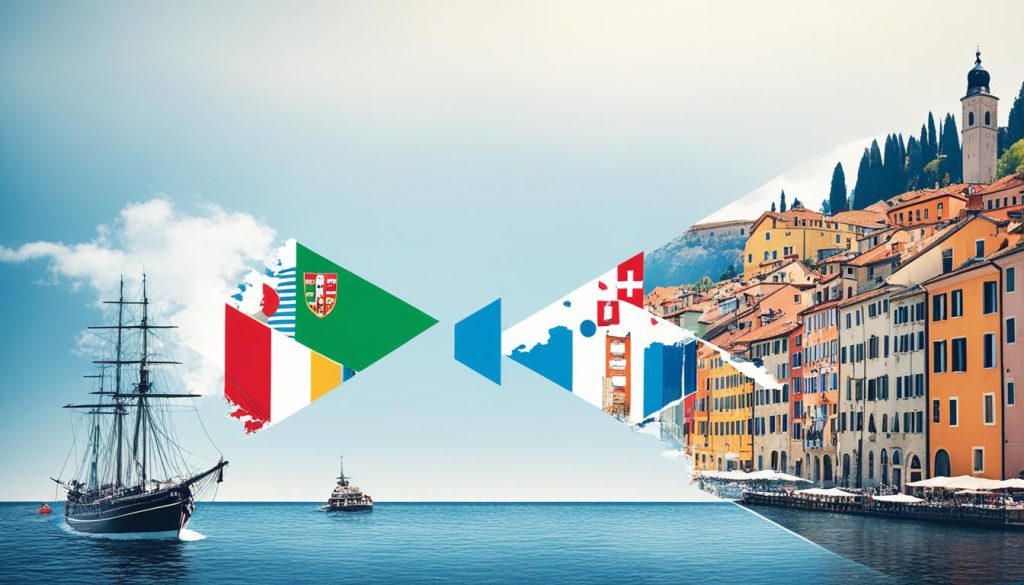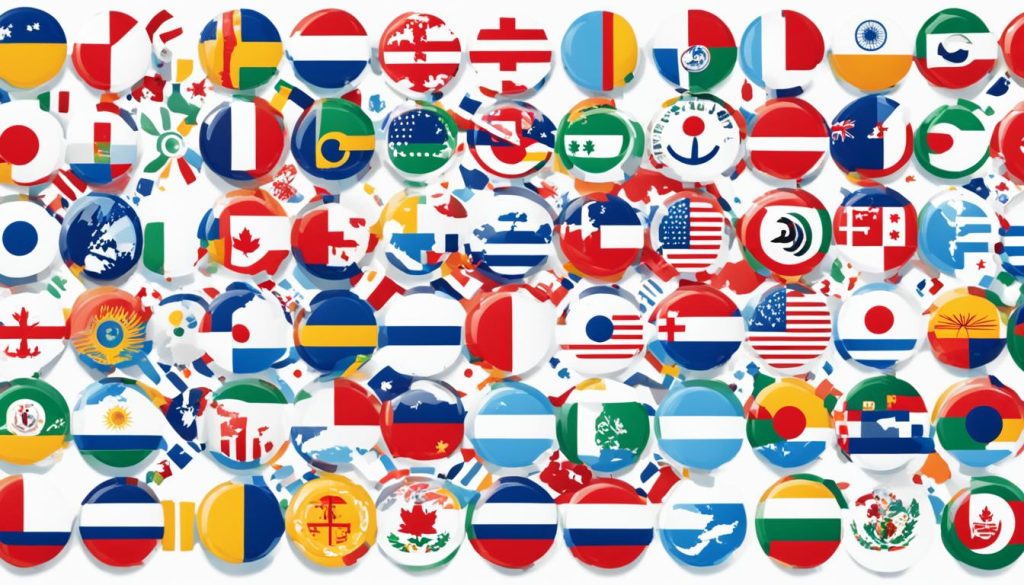Learning about international business means diving into cultural details. This is key when looking at how Nordic countries, Germany, and Italy operate. These places each have their own set of traditions and business manners.
In global business, the Nordic countries are praised for their fairness and creativity. Germany is known for its business efficiency and precision. Italy, with its deep history, brings a unique touch through family-led businesses.
Getting to grips with these differences is vital for worldwide business success. Knowing about different cultures helps businesses work well internationally. This can lead to successful partnerships and growth across Europe’s varied economies.
An Overview of Different Business Cultures in Europe
The business cultures in Europe are varied and diverse. Management styles and organisational practices differ widely across countries. These differences reflect the unique cultures of each nation.
In Europe’s business world, understanding local customs is key. For companies going global, it’s important to grasp the finer points of advertising, communication, and time perception. Knowing these can help build strong bonds in new markets and avoid cultural mistakes.
- It’s essential to know local management ideas to lead in a way that fits cultural expectations.
- Finding out how businesses are structured in a country can help navigate bureaucracy.
- Understanding labour laws and employee rights aids in planning HR strategies and improving teamwork.
Getting to grips with these cultural aspects is crucial. It helps avoid misunderstandings, strengthen business ties, and make negotiations smoother. Truly knowing European business cultures is vital for any manager aiming to succeed on the international stage.
Defining Cultural Dimensions and Their Impact on Business
Global management is complex, shaped by different cultural dimensions. Understanding these dimensions helps us see how culture impacts business internationally.
Explaining Hofstede’s Cultural Dimensions
Hofstede’s cultural dimensions are essential for grasping societal values’ effect on business. They explore the acceptance of hierarchy and encourage equal decision-making in various countries.
Uncertainty avoidance is another critical aspect. It shows how cultures deal with the unknown. Cultures differ in adopting strict rules to keep order. Hofstede’s framework highlights these dynamics within global management:
- Performance orientation focuses on achievement.
- Assertiveness affects how people communicate at work.
- Future orientation looks at investment in what’s next.
- Humane orientation measures community care levels.
- Collectivism checks how societies balance team and individual efforts.
- Gender egalitarianism examines equality between genders.
Understanding the GLOBE Project’s Findings
The GLOBE project builds on Hofstede’s ideas. It offers deep insights into cultural dimensions affecting global business. It analyses culture’s role in leadership and strategy.
This project highlights cultural diversity’s role in management. Different cultures need bespoke approaches for effective management. The GLOBE project points out the importance of:
- Tailoring strategies to different cultural views.
- Understanding cultural diversity in global business.
- Grasping cultural dimensions in cross-cultural operations.
These studies are vital tools for international business leaders. They guide through cultural complexities, aiming for success in a diverse world.
Comparing Corporate Hierarchies in European Countries
The world of corporate hierarchies in European businesses is quite interesting. It mixes different organisational structures rooted in cultural practices like power distance. This mix highlights the unique way businesses operate in Europe.
European companies vary in how they share power. In countries like France, where power distance is high, businesses tend to have a more centralised structure. Here, there’s a clear difference in status between top management and the workers.
On the other hand, Scandinavian countries prefer a more equal setup. They like flatter structures that boost teamwork and open talk among all workers. This approach makes everyone feel involved and responsible.
German companies take a middle path. They keep a clear chain of command similar to centralised systems. But, they also let workers have a say in decisions, somewhat like flat hierarchies.
- High power distance leads to tall, centralised hierarchies.
- Low power distance favours flat, decentralised organisational structures.
- German businesses reflect clearer lines of authority with a tendency towards employee inclusion.
The changing nature of Europe’s corporate structures shows its diverse business culture. Understanding these structures is key for anyone wanting to do well in the European business scene.
The Role of Trust and Transparency in Nordic and German Businesses
In Europe’s business world, Nordic and German companies excel because they value trust and openness. Their approach sets a high standard. Global businesses look up to them, aiming to succeed in today’s market.
Denmark’s High Trust Culture and Its Implications for Business
Denmark’s business scene thrives on a strong trust among people involved. It’s not just about following rules. Trust guides all deals. This makes things run smoothly. And since it’s easy to start a business there, Denmark attracts many new companies and investors. They like the clear and fair business scene.
Germany’s Emphasis on Transparency and Efficiency
German business has a unique blend of structure and openness. People talk straight and everything is done carefully. This way, every part of a company helps keep things in order and makes sure everyone is honest. This clear openness ensures Germany’s businesses are known for being reliable and efficient.
Danish and German business strategies show how important trust and clear dealings are. They prove that being open and trustworthy builds strong, lasting business ties and helps the economy grow. Their success story is an inspiration across the globe for its direct approach and results.
Communication Styles Across Businesses in Italy and Nordic Countries
When talking about communication styles in international business, there’s a clear difference between Italian businesses and those in the Nordic countries. These differences are not just academic. They actually shape how companies operate and deal with each other.
In Italian businesses, people communicate in a way that’s full of expression and subtlety. This reflects Italy’s rich history in art and storytelling. You’ll find people using body language, tone, and gestures a lot. They add meaning beyond just words.
On the other hand, Nordic corporate communication is all about being clear and to the point. It values being straightforward and open. This approach encourages everyone within a company to speak up, mirroring the egalitarian values of Nordic societies.
-
Expressive and Implicit Communication in Italian Corporate Settings
- Use of emotional intelligence and context-based cues
- Preference for face-to-face interactions to build strong connections
- High reliance on non-verbal communication elements
-
Direct and Participative Communication in Nordic Business Cultures
- Encouragement of straightforward and transparent dialogue
- Effective use of flat hierarchies for inclusive communication practices
- Emphasis on consensus and collaborative decision-making processes
These different communication styles affect everything from negotiations to daily operations in companies. They influence how staff interact, how management works, and how companies deal with clients. Understanding these communication styles is vital. It helps business people work better in these European markets, improving cross-cultural talks and internal communication.
The Significance of Work-Life Balance in Nordic Countries and Italy
In Nordic countries and Italy, finding a good work-life balance is key. It shows what a society values and focuses on economically. For example, in places like Sweden, Norway, and Finland, balancing work and life is a right, not a luxury. Their strong social support systems offer long parental leave, flexible work hours, and lots of holiday time.
In Italy, though, views on work-life balance can be more traditional. People often highlight family and work duties, which makes finding balance tough. Yet, changes in how organisations and society think are starting to make a difference in Italy’s work-life balance.
- Importance of work-life balance in reducing stress and increasing productivity.
- Adaptation of flexible work policies in the Nordic countries as standard practice.
- Influence of European Union policies on improving work-life balance in member countries.
Ultimately, both the Nordic countries and Italy aim to improve life quality. They do this through measures that recognise the importance of work-life balance. This focus shapes how companies operate and what laws are made. It sets an example for countries that want to keep their workers happy and succeed economically.
Approaches to Innovation and Performance in Germany and Nordic Countries
Germany and the Nordic countries are known for their focus on innovation and business performance. They have a special way of doing business that supports and values new ideas. This approach mixes taking risks with careful planning to boost their economies.
Looking closely at Germany, we see a strong foundation for new ideas. The country pours a lot of money into research and development. This focus on innovation has made its manufacturing and engineering sectors leaders worldwide. Germany is also known for its high-quality products and efficient systems.
In the North, the Nordic innovation strategies have moved beyond their natural riches. They now excel in green tech, digital services, and life sciences. These countries work closely with schools, companies, and the government to spark new ideas. This teamwork is strengthened by policies that help invention grow.
- Promotion of groundbreaking technical advances and sustainable solutions.
- Investment in education and continuous learning to enhance skill sets aligned with future markets.
- Supportive governmental frameworks that incentivise innovation and development.
The way Germany and the Nordic countries value innovation is key to their global success. They invest in training their people, which keeps their work quality high. This focus on being the best and being bold helps them lead in innovation worldwide.
To wrap up, both Germany and the Nordics have their own ways of promoting new ideas. But their shared goal is to boost business through innovation. These approaches show how thinking ahead can lead to lasting success and competitiveness in business.
The Influence of Institutional Collectivism on German and Italian Businesses
The concept of institutional collectivism is a fascinating prism through which to view and understand the varying dynamics within German businesses and Italian corporate culture. This cultural dimension articulates how corporates in these countries weave individualism and collectivism into their organisational frameworks. It fundamentally influences workplace conduct and corporate governance.
In German businesses, the lower degree of institutional collectivism champions individual achievements and rewards personal initiatives. The workplace environment encourages independence and the attainment of individual objectives. This correlates with competitive market practices and drives innovation. Conversely, the Italian corporate culture embodies higher levels of collectivism. Cohesive group efforts are foregrounded. The cultural fabric of Italian enterprises is often characterised by a strong focus on familial bonds within corporate entities. This promotes loyalty and collective goals over personal ambitions.
- Germany’s emphasis on individualistic pursuits sees a higher allocation of resources towards personal development and responsibility within the job role.
- Italian firms capitalise on team solidarity and group cohesion, facilitating environments where teamwork and corporate community thrive.
These distinct approaches to institutional collectivism affect many aspects of corporate life. They impact organisational hierarchies and decision-making processes. They show the rich variety of European business cultures that continues to challenge and shape the global marketplace. Whether it’s the efficiency-driven corridors of Germany’s powerhouse industries or the relationship-centric boardrooms of Italy, understanding these cultural constructs is key. It’s pivotal for any international business strategy aiming to engage with these markets.
Assertiveness in Business: A Comparative Analysis of Italy and Nordic Region
International business diplomacy varies greatly across Europe. Italian firms are known for their assertive approach. This is quite different from the negotiation style in the Nordic region.
Knowing the differences between these approaches is key for successful business talks.
Italy’s Business Negotiation Style
Italian business talks are defined by assertiveness. This feature is visible in their decision-making and in how they solve conflicts. Communication is strong and straight to the point.
This reflects Italian managers’ confidence in negotiations. Yet, this approach can be a double-edged sword, based on who you are dealing with.
Nordic Countries’ Consensus-Driven Approach
The Nordic region, however, prefers a consensus-driven approach. Their focus is on working together and reaching unanimous decisions. This style is based on giving everyone a say and trying to agree together.
It’s part of a larger culture that values equality and trust. Success in Nordic negotiations comes from mutual respect and working together for a common goal.
Future Orientation in Business Strategies: Italy versus Nordic Countries
In business strategies, future orientation is vital for growth and innovation. Italy and Nordic countries differ greatly in long-term planning. The Nordics focus more on the future in their strategies, welcoming new ideas.
Nordic businesses weave foresight into their operations. They prepare for future changes, sustainability, and tech advances. This future planning contributes to their strong economies and innovative growth.
- Investment in research and development
- Long-term sustainability goals
- Digitalisation and technology adoption
- Workforce upskilling programmes
In contrast, Italy treasures its history and tradition in its business strategy. Italian firms often chase immediate results. This can lead to less focus on future outcomes.
Still, Italian companies do plan for the future in areas like fashion and automotive. They invest in design and innovation, pushing their brands forward.
- Navigating current market trends
- Immediate customer satisfaction over prospective needs
- Preservation of heritage and brand identity
Europe’s economy is mixing these approaches, with Italian companies adopting Nordic long-term strategies. The Nordics, in turn, learn from Italy’s swift market responses. This mix hints at a prosperous future, driven by diverse business ideals.
Gender Egalitarianism and Its Effect on Business Practices
The push for gender fairness changes business a lot. It’s especially clear in making workplaces inviting for women leaders and valuing everyone’s input. Countries embracing this change enjoy a more innovative business world. Nordic nations, in particular, are leading in gender equality. This has improved their corporate scene and economy as a whole.
The gap between Italy and places like Sweden shows how important gender fairness is. Nordic countries are pioneering in including everyone fairly in business. Italy is catching up, trying to close the gender gap. This shows that having both genders well-represented leads to business success.
Promoting Women in Leadership Roles
Boosting women into leadership is key for fair gender practices at work. In Germany, smart companies see the benefit of having diverse leaders. This leads to better decisions and stronger leadership. By helping women reach top jobs, businesses build a fairer and more inclusive setting.
Comparing Gender Inclusion in the Workplace
Having a diverse workplace is crucial. It goes beyond being a good gesture; it’s smart strategy. Looking at Germany, Italy, and Nordic countries, we see different levels of gender fairness. Germany is in the middle, trying to balance old and new ways. Italy is just starting to include everyone fairly. Nordic countries are leaders, making fairness in business a key part of their culture.
- The emphasis on women leadership in Sweden is setting standards for other European countries.
- Germany’s progress in inclusive business practices shows a commitment to gender inclusion without sacrificing efficiency.
- Italy’s ongoing transformation displays an increased awareness of the need for workplace diversity, to resonate with global business norms.
Analysing the Business Culture Complexity Index in the Context of Europe
Exploring Europe’s business cultures shows the importance of the Business Culture Complexity Index (BCCI). It helps companies grasp the cultural challenges in international markets. For example, Denmark in Scandinavia shows how a simple business culture can ease business dealings.
Denmark’s Position as Least Complex
Denmark stands out in Europe for its simple business culture, thanks to the BCCI. Trust, happiness among people, and economic freedom are key. These factors shape a professional ethos that values simplicity, making it easier for international businesses to operate in Denmark.
Implications of the BCCI on International Business Relations
The BCCI implications give insights into how businesses interact across borders. It links cultural complexity with human development and internet use. Understanding these links is vital for international business. It shows that cultural dynamics deeply influence business relationships globally.
Adapting Management Functions to Cultural Differences
In a world where businesses go global, adapting management to fit cultural differences is key. By blending cultural adaptation with international management, firms can create cultural methodologies. These respect local business traditions and draw on the strengths of varied cultural insights. This boosts planning and strategic thinking.
Impact of Culture on Planning and Organising
Cultural details deeply affect organisational planning. For instance, societies that look far ahead focus on future needs and long-term plans. On the other hand, cultures focused on avoiding risks stress on backup plans to avoid possible problems. It’s vital to weave these cultural aspects into planning for better harmony and lasting success.
Leadership Styles Suited to Different Cultures
Leadership varies widely across the world, showing cultural depth. In places with high power distance, leaders often make decisions solo. Yet, in areas with lower power distance like many Nordic and Western nations, teamwork and empowerment are key. Adapting leadership to these cultural nuances is crucial in global leadership.
Control Mechanisms Across Varied Cultural Spectrums
Tailoring control mechanisms to match cultural views on authority and freedom at work is important. In cultures that are more formal, strict rules are common. Meanwhile, cultures that value independence might prefer flexible, outcome-focused controls. Adjusting these methods to fit cultural values is key for cultural management strategies and business success.
Fine-tuning an organisation’s core functions to overcome cultural barriers can make a firm more unified and inventive. It paves the way for a stronger global presence.
Globalisation and Its Effects on Business Cultures
Globalisation has created a world of diverse cultures in today’s businesses. This change brings cultural integration to the forefront, mixing different traditions and work styles. Companies now feature a mix of cultures, thanks to an international workforce. They are evolving to meet global market needs.
With globalisation, businesses must adopt a wider perspective, ready for an international workforce. Business boundaries are fading, making cultural understanding more crucial. Academic theories, like those from Geert Hofstede, offer insights for working in a global economy.
- Understanding the Impact of Cultural Dimensions: Knowing about cultural dimensions helps foresee challenges and use them to our advantage.
- Nurturing Cultural Sensitivity: It’s important to respect cultural differences to build strong international ties and make employees happy.
- Adapting Communication Strategies: Businesses need clear communication that fits different cultures, especially if they operate globally.
Globalisation is changing local business scenes into global stages. Success now depends on how well a business can blend cultures and navigate international markets.
Conclusion
Our study takes a close look at cultural differences in business among Nordic countries, Germany, and Italy. We see how important it is to know and adjust to these cultures in global business. It’s about more than just seeing differences. It’s about bringing them into your business in a way that works well with local customs.
For businesses in Europe, it’s key to understand how society and business actions affect each other. For example, a British company working with a German one needs to get used to a more top-down way of managing. On the other hand, working in Scandinavia means a more equal way of dealing with things. And in Italy, it’s important to get how they communicate and work together.
Being able to work well in different cultures sets smart businesses apart. With Europe’s cultures getting easier to access globally, those who adapt well to different business cultures can do very well. They’ll enjoy better cross-cultural relations and more success in business. As our world gets more connected, Europe’s variety in culture and business can help guide us. It helps in reaching across borders in the global business scene.
















